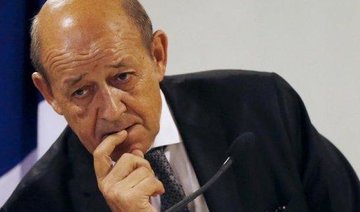SEOUL: North Korea said on Sunday it has developed an advanced hydrogen bomb that possesses “great destructive power” as US President Donald Trump and Japanese Prime Minister Shinzo Abe talked by phone about the “escalating” nuclear crisis.
The report by North Korea’s official KCNA news agency comes amid heightened regional tension following Pyongyang’s two tests of intercontinental ballistic missiles (ICBM) in July that potentially could fly about 10,000 km (6,200 miles), putting many parts of the mainland United States within range.
Under third-generation leader Kim Jong Un, North Korea has been pursuing a nuclear device small and light enough to fit on a long-range ballistic missile, without affecting its range and making it capable of surviving re-entry into the Earth’s atmosphere.
North Korea, which carries out its nuclear and missile programs in defiance of UN Security Council resolutions and sanctions, “recently succeeded” in making a more advanced hydrogen bomb that will be loaded on to an ICBM, KCNA said.
“The H-bomb, the explosive power of which is adjustable from tens kiloton to hundreds kiloton, is a multi-functional thermonuclear nuke with great destructive power which can be detonated even at high altitudes for super-powerful EMP (electromagnetic pulse) attack according to strategic goals,” KCNA said.
“All components of the H-bomb were homemade and all the processes ... were put on the Juche basis, thus enabling the country to produce powerful nuclear weapons as many as it wants,” KCNA quoted Kim as saying.
Juche is North Korea’s homegrown ideology of self-reliance that is a mix of Marxism and extreme nationalism preached by state founder Kim Il Sung, the current leader’s grandfather. It says its weapons programs are needed to counter US aggression.
North Korea offered no evidence for its latest claim, and Kim Dong-yub, a military expert at Kyungnam University’s Institute of Far Eastern Studies in Seoul, was skeptical.
“Referring to tens to hundreds of kilotons, it doesn’t appear to be talking about a fully fledged H-bomb. It’s more likely a boosted nuclear device,” Kim said, referring to an atomic bomb which uses some hydrogen isotopes to boost explosive yield.
A hydrogen bomb can achieve thousands of kilotons of explosive yield — massively more powerful than some 10 to 15 kilotons that North Korea’s last nuclear test in September was estimated to have produced, similar to the bomb dropped on Hiroshima, Japan, in 1945.
HOURGLASS-SHAPED DEVICE
Kim Jong Un, who visited the country’s nuclear weapons institute, “watched an H-bomb to be loaded into new ICBM” and “set forth tasks to be fulfilled in the research into nukes,” KCNA said.
Pictures released by the agency showed Kim inspecting a silver-colored, hourglass-shaped warhead in the visit accompanied by nuclear scientists, with a concept diagram of its Hwasong-14 long-range ballistic missile seen hanging on the wall.
The shape shows a marked difference from pictures of the ball-shaped device North Korea released in March last year, and appears to indicate the appearance of a two-stage thermonuclear weapon, or a hydrogen bomb, said Lee Choon-geun, senior research fellow at state-run Science and Technology Policy Institute.
“The pictures show a more complete form of a possible hydrogen bomb, with a primary fission bomb and a secondary fusion stage connected together in an hourglass shape,” Lee said.
Tensions on the Korean peninsula have been high since last month when North Korea threatened to launch missiles into the sea near the strategically located US Pacific territory of Guam after Trump said Pyongyang would face “fire and fury” if it threatened the United States.
North Korea further raised regional tensions on Tuesday by launching an intermediate-range ballistic missile over Japan, drawing international condemnation.
Trump and Abe spoke by phone and said that in face of an “escalating” situation with North Korea that close cooperation between their countries and with South Korea was needed, Abe told reporters.
Trump told Abe that the United States, as an ally, was 100 percent with Japan, Deputy Chief Cabinet Secretary Yasutoshi Nishimura told reporters.
“The two leaders reaffirmed the importance of close cooperation between the United States, Japan and South Korea in the face of the growing threat from North Korea,” the White House said in a statement. “President Trump noted that he looks forward to continued trilateral coordination on the margins of the United Nations General Assembly.”
The United States has repeatedly urged China, the North’s sole major ally, to do more to rein in its neighbor.
Experts and officials have said North Korea could conduct its sixth nuclear test at any time, and that the reclusive country has maintained a readiness at its nuclear test site to conduct another detonation.
The KCNA report made no mention of plans for a sixth nuclear test.
US officials have told Reuters that while North Korea has had parts in place for a nuclear detonation going back several months, no new activity had been seen recently at its known nuclear test site in Punggye-ri in its northeastern region.
North Korea last year conducted its fourth and fifth nuclear tests, saying the fourth in January 2016 was a successful hydrogen bomb test, although outside experts say the claim has not been proved.
Earthquakes triggered by North Korean nuclear tests have gradually increased in magnitude since Pyongyang’s first test in 2006, indicating it is steadily improving the destructive power of its nuclear technology.
Its fifth nuclear test in September 2016 was measured to be possibly North Korea’s biggest detonation ever, but the earthquake it caused was still not believed to be big enough to demonstrate a thermonuclear test.
Impoverished North Korea and the rich, democratic South are technically still at war because their 1950-53 conflict ended in a truce, not a peace treaty. The North regularly threatens to destroy the South and its main ally, the United States.























